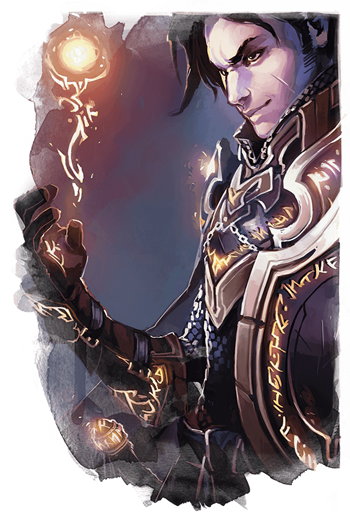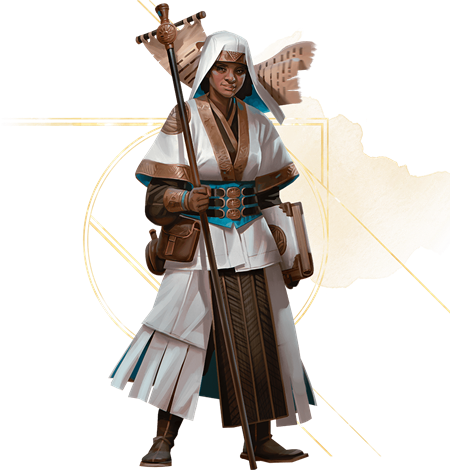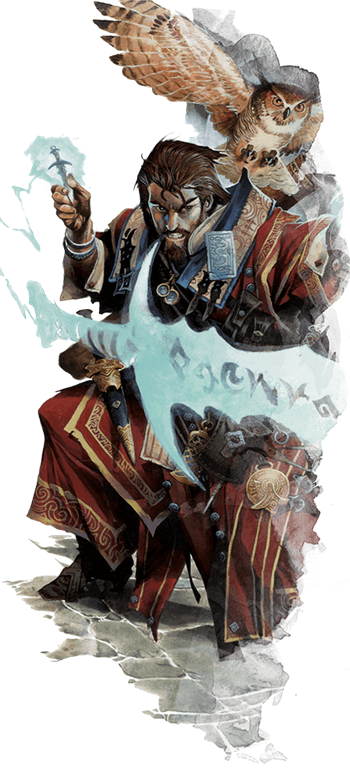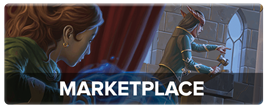
Few D&D adventures end without something magical happening. Whether helpful or harmful, magic appears frequently in the life of an adventurer, and it is the focus of chapters 10 and 11 [of the D&D Basic Rules].
In the worlds of Dungeons & Dragons, practitioners of magic are rare, set apart from the masses of people by their extraordinary talent. Common folk might see evidence of magic on a regular basis, but it’s usually minor—a fantastic monster, a visibly answered prayer, a wizard walking through the streets with an animated shield guardian as a bodyguard.
For adventurers, though, magic is key to their survival. Without the healing magic of clerics and paladins, adventurers would quickly succumb to their wounds. Without the uplifting magical support of bards and clerics, warriors might be overwhelmed by powerful foes. Without the sheer magical power and versatility of wizards and druids, every threat would be magnified tenfold.
Magic is also a favored tool of villains. Many adventures are driven by the machinations of spellcasters who are hellbent on using magic for some ill end. A cult leader seeks to awaken a god who slumbers beneath the sea, a hag kidnaps youths to magically drain them of their vigor, a mad wizard labors to invest an army of automatons with a facsimile of life, a dragon begins a mystical ritual to rise up as a god of destruction—these are just a few of the magical threats that adventurers might face. With magic of their own, in the form of spells and magic items, the adventurers might prevail!
—D&D Basic Rules, “The Wonders of Magic”
Faithful readers of this series on worldbuilding, how important is magic in your world? How does magic shape the day-to-day life of common folk, of adventurers, or of politically savvy faction leaders and nobility? How frequently will adventurers find magic items while they travel the world? Do the gods make themselves known daily through their clerics, or is the act of spellcasting itself a miracle? And has the world itself been molded by magic, as archdruids send treants to spread forests far and wide, and artificers warp the landscape through ill-advised experimentation?
If you already have a homebrew world you’re playing in, these are questions to reflect upon. Pull out your notebook or your digital campaign notes and write down answers to the questions you hadn’t considered. And if you’re creating a new world from scratch right now, these questions are vital ones to consider while making the foundation for your setting. If you build your stories and political structures too high without considering the basic foundation of magic, your entire setting can crumble when your players reach 5th level and higher, and start to come into incredible magical power themselves.
Also, check out the previous articles in our series on worldbuilding:
- Worldbuilding with Style and Subtlety
- Worldbuilding through Encounters
- Worldbuilding with Legendary Monsters
- Worldbuilding with your Players

How Common is Magic?
Magic is a cornerstone of D&D settings. Thanks to the prevalence of spells, magic items, and magical monsters, a D&D setting devoid of magic feels wrong, somehow. Magic is so foundational to the identity of D&D, that removing this cornerstone requires you to homebrew so much extra scaffolding to fill the gaps that you may as well have built your own RPG system from scratch—and there are a dozen great RPG systems out there that fill the high-fantasy, low-magic niche spectacularly, without requiring you to do all that homebrew legwork.
Because of that, we’re going to be taking D&D and its magical worlds at face value in this worldbuilding article. You can modulate the prevalence of magic a little bit—make magic so prevalent that it’s akin to technology, such as in Eberron, or make magic so dangerous that using it is an inherently evil act, like in Dark Sun. Most settings, however, fall into a middle ground where magic is part and parcel of the adventurer’s lifestyle, and of national and factional politics, but doesn’t affect the day-to-day of the common folk too much. In places like Wildemount and the Forgotten Realms, there’s no doubt that gods and magic are real and affect the world every day—but unless you’re an arcane scholar or an adventurer who battles monsters for a living, there are good odds your only exposure to magic is when a Gandalf-esque traveling hedge mage comes to town once or twice a year to perform some tricks of prestidigitation.
I encourage you, if you wish to create a world where magic is as rare and miraculous as it is in real-world folk tales, or low-magic fantasy stories, to either seek out another system—or, prepare for the consequences of your party being essentially superheroes. I think the idea of being magical fantasy superheroes is a thrilling concept for a campaign; you are people whose powers have grown so far beyond mortal comprehension that you are utterly unrelatable to the common folk. You are like demigods divorced from your humanity at all but the most fundamental level, and must grapple with the psychological and moral ramifications of that.
That’s a wonderful conceit—but it’s a dominating flavor to cast unwittingly into your worldbuilding stewpot. Please deviate from the norms of D&D however you wish, but do so with caution.
Magic as an Institution
 Lots of fantasy settings have organizations that deal in magic and relics as commonly as trade guilds deal in merchandise and gold. These may be institutions of learning, such as Blackstaff Tower in Waterdeep, or the Soltryce Academy in Rexxentrum. Or they could be instruments of political power, in which mages gather to protect the order and stability of a nation, like the Cereberus Assembly of the Dwendalian Empire—or, simply an order of magi who wish to enrich themselves with untold magical power from ages long past, like the Arcane Brotherhood in Luskan.
Lots of fantasy settings have organizations that deal in magic and relics as commonly as trade guilds deal in merchandise and gold. These may be institutions of learning, such as Blackstaff Tower in Waterdeep, or the Soltryce Academy in Rexxentrum. Or they could be instruments of political power, in which mages gather to protect the order and stability of a nation, like the Cereberus Assembly of the Dwendalian Empire—or, simply an order of magi who wish to enrich themselves with untold magical power from ages long past, like the Arcane Brotherhood in Luskan.
This seems like a rather logical way for things to play out in a setting where magic is a known quantity, and its use isn’t demonized. In settings where magic is rarer than usual, or perhaps it is misunderstood as devilry, magic-users are wont to be more reclusive, teaching their ways in secret. Settings like this give rise to hermit-like wizards who create towers in distant wastelands, so that they can practice their cosmic powers away from limited minds. Do magic-users in your setting gather in cities? Or in the wilderness?
Reclusiveness of this nature can also be born from settings where magic is common, but there are certain magical norms in place. Necromancy is a perfect example of a socially deviant sort of magic “standard” D&D, because turning the dead into mindless automata is seen as a deeply evil act—and so necromancers often practice their art in secret to avoid persecution. I think enchantment is a great choice for DMs who want to create a less stereotypical sort of taboo magic. Literally twisting the minds of the masses to your will, blurring the lines between consent and coercion—it’s easy to see how a people would rise up against enchanters! Are magic-users in your setting wielding dark power? Or are they misunderstood? Or, could the issue be more complicated than simple “good” and “evil?”
On the other hand, you could make certain schools of magic wrongly demonized for social reasons, much in the way that many marginalized people are wrongly treated as deviants or as second-class citizens in real life. Likewise, certain magical factions could be misunderstood—either because of that faction’s own intentional duplicity, or because the common folk misunderstand and fear them, or because the powers that be want to discredit an institution that could pose a threat to their rule. Are magic-users in your setting allies of nations? Or are they enemies? Do they want social power? Or do they already have all the power they need?
Magic of the Gods
 Gods are a complex subject—complex enough for their own separate worldbuilding article! Nevertheless, it’s worth bringing them up in the context of how magic affects your worldbuilding, namely because of divine magic’s role in healing. Healing isn’t all clerics can do, nor is healing exclusively the domain of clerics, but the role of the healer cleric is an iconic one that deserves special recognition.
Gods are a complex subject—complex enough for their own separate worldbuilding article! Nevertheless, it’s worth bringing them up in the context of how magic affects your worldbuilding, namely because of divine magic’s role in healing. Healing isn’t all clerics can do, nor is healing exclusively the domain of clerics, but the role of the healer cleric is an iconic one that deserves special recognition.
If healing magic is commonly associated with the gods, then it stands to reason that public health is the domain of religious institutions in your setting. This isn’t a particularly ahistorical fact, either. Many early hospitals and sanatoriums were church-sponsored in Europe, so it makes sense for a European-inspired fantasy setting to mimic this. (Though, if your setting isn’t European-inspired, then you may want to consider how you can de-link healing and the gods so that you don’t accidentally emulate this archetype.)
How many members of the clergy are clerics, like the class? How many clergy are people of faith, but lack the magical powers that clerics possess? Does every little village in your setting have a church led by a priest, or even a lesser acolyte (both stat blocks with access to miraculous magic). If not, then how far would the average person have to travel in order to see a cleric to have diseases cured or bones mended? Would it cost them an arm and a leg?
Likewise, if churches have literal miracle-workers at their beck and call, are they a political force unto themselves? Does the church, much like they did in Medieval Europe, have power greater than any nation, thanks to the power of their holy knights and inquisitors? If a monarch is unfaithful to the church, what would happen? Would assassins arrive in the royal palace, their pockets filled with gold drawn from the tithing box? Would civil war erupt?
As said above, this topic is deserving of its own article, but the intersection of magic, religion, and political power is a potent tool for you to use in your own worldbuilding. Studying real-world history and theorizing what would happen if you to add literal divine magic to the mix is a great place to start building any fantasy setting.
Magic Items as Relics or as Tools
Unless you decide your campaign works otherwise, most magic items are so rare that they aren’t available for purchase. Common items, such as a potion of healing, can be procured from an alchemist, herbalist, or spellcaster. Doing so is rarely as simple as walking into a shop and selecting an item from a shelf. The seller might ask for a service, rather than coin.
In a large city with an academy of magic or a major temple, buying and selling magic items might be possible, at your discretion. If your world includes a large number of adventurers engaged in retrieving ancient magic items, trade in these items might be more common. Even so, it’s likely to remain similar to the market for fine art in the real world, with invitation-only auctions and a tendency to attract thieves.
 The Dungeon Master’s Guide tells us that the standard assumption for a D&D setting is that magic items are masterwork relics of a bygone age, like a long-lost Picasso portrait that can also shoot fire out of its eyes three times per day. This is a suitable worldbuilding assumption for this edition of D&D, where magic items are always gravy on top of the impressive suite of destructive powers that player characters gain over the course of their adventuring careers.
The Dungeon Master’s Guide tells us that the standard assumption for a D&D setting is that magic items are masterwork relics of a bygone age, like a long-lost Picasso portrait that can also shoot fire out of its eyes three times per day. This is a suitable worldbuilding assumption for this edition of D&D, where magic items are always gravy on top of the impressive suite of destructive powers that player characters gain over the course of their adventuring careers.
But this is not the way D&D has always worked. In previous editions of the game, gaining new magic items were part and parcel of a character’s power progression. The balance of the game assumed that you had a specific number of magic items at every level of the game—as opposed to now, where it assumes you have none, and lets the Dungeon Master increase the power of encounters ad hoc to suit your advanced power if you do have them.
The availability of magic items is a point where the mechanics of D&D and the stories you can tell in D&D are invariably intertwined. Settings like Eberron, where artificers create miraculous arcane inventions and everyone in Sharn has a feather token on hand in case of an accident, are wildly different from settings like the Forgotten Realms, where even a bag of holding is a miraculous artifact from an age long passed. Decisions you make about the power level of your game will affect your world, and vice-versa.
If you want to make magic items rare, like in the Forgotten Realms, then you can add depth and flavor to your world’s magical artifacts by thinking about where they came from. What ancient, warlike empire did the vast majority of magical weapons hail from? What kind of ruins can they be found in? What aesthetic trappings do magic items from different ancient cultures have? Ask these sorts of questions for all types of items; maybe another civilization was focused on pure arcane power, rather than melding magic and weaponry, and so focused on creating things like staves and wands. Asking these sorts of questions will let even your treasure rewards serve as important worldbuilding tools.
If you want to make magic items common, like in Eberron, then the above advice still applies—who’s the Apple or Microsoft of your world’s magic item industry? Who makes weapons for the military? But there are also other questions you can ask that inform your ideas of class and political power within your setting. Back in the ‘70s, it was basically impossible for anyone but the government or the extremely wealthy to own a computer. Now, everyone has a personal computer more sophisticated than the machine that took a man to the moon in their pocket. In a setting where magic items are analogous to technology, who does that technology help? Who has access to it? Who’s using it to do good? Who’s abusing it?
Have you ever thought about magic in your setting? What sets your world apart from others? Let us know in the comments below!
Create A Brand-New Adventurer Acquire New Powers and Adventures Browse All Your D&D Content
 James Haeck is the lead writer for D&D Beyond, the co-author of Waterdeep: Dragon Heist, Baldur's Gate: Descent into Avernus, and the Critical Role Explorer's Guide to Wildemount, a member of the Guild Adepts, and a freelance writer for Wizards of the Coast, the D&D Adventurers League, and other RPG companies. He lives in Seattle, Washington with his fiancée Hannah and their animal companions Mei and Marzipan. You can find him wasting time on Twitter at @jamesjhaeck.
James Haeck is the lead writer for D&D Beyond, the co-author of Waterdeep: Dragon Heist, Baldur's Gate: Descent into Avernus, and the Critical Role Explorer's Guide to Wildemount, a member of the Guild Adepts, and a freelance writer for Wizards of the Coast, the D&D Adventurers League, and other RPG companies. He lives in Seattle, Washington with his fiancée Hannah and their animal companions Mei and Marzipan. You can find him wasting time on Twitter at @jamesjhaeck.











-
View User Profile
-
Send Message
Posted Jul 15, 2020Love this series. Playing in Runeterra, I made a high level of common or uncommon magic items, but rare and higher aren't anywhere near that. As they were in Bilgewater, little trinkets and similar things were fun, but now they are in Ionia. Even though it is very magical, it is more honouring tradition and what has happened. Sure, every tea shop or house has a +1 longsword or important trinket, or maybe even a staff of birdcalls, but no-one uses them. Magic is common, but magic items are not used loads. Love this series, can't wait for the next one, and class 101!.
-
View User Profile
-
Send Message
Posted Jul 15, 2020Second!
Great article James!
-
View User Profile
-
Send Message
Posted Jul 15, 2020This is quite good.
-
View User Profile
-
Send Message
Posted Jul 15, 2020In the homebrew world I'm building and running two games in, I'm employing a lot of this thinking since the world is relatively young and the first majestic kingdoms with unbelievable magic power and items are just beginning to hit the first level of magic proliferation. Common and uncommon items are easy to find and create, as new experiments are done to bypass the reliance on recipes involving parts from magical flora or fauna.
Depending on who the players ally themselves with, and the choices they make, they could have a hand in guiding the rise of these mighty magical empires, perhaps even setting them on good, stable paths rather than the pursuit of power at the expense of safety and sense that typically results in the fall of such magical empires. It's a fun space to play in, the rise of these magical empires, though it does mean there's a bit less deep lore around magic items for me to hint at to my players. But, instead, the players get to create those legends themselves and see them in later campaigns if we keep playing together.
-
View User Profile
-
Send Message
Posted Jul 15, 2020There's a few typos in the section " How Common is Magic?"
first: "... or an adventure who battles monsters for a living..." should be "... or an adventurer who battles monsters for a living..."
second: "That’s a wonderful conceit" should be "That’s a wonderful concept"
;)
-
View User Profile
-
Send Message
Posted Jul 15, 20206th! i love thes they are so good!
-
View User Profile
-
Send Message
Posted Jul 15, 2020Fascinating discussion, thanks, James. I like all the prompting questions for worldbuilders to decide on the details, but I notice there's one kind of question you don't ask here: namely, Why? By that I don't mean, "Why have magic in D&D at all?" interesting though that might be to explore. Rather, I'm interested in the why-questions about the in-fiction explanations of magical scarcity. I think these raise further interesting and potentially difficult discussions about the fictional worlds we create.
For example, you quote the Basic Rules as saying:
Why is this the case? Is it because some people have a spark of magical ability that others lack? This would surely have social and political ramifications: consider the division between Jedi/Sith and Force-insensitive people in Star Wars, or between mutants and ordinary humans in X-Men. Or is the rarity of magic-users more to do with access to training? That is to say, anyone could become a wizard, cleric, artificer, etc., but the education and materials and time needed are simply not available to the average person. That suggests a pretty serious structural injustice in the fictional world, akin to a lack of access to education in the real world.
Another assumption you note is that, by default in 5e and in the Forgotten Realms, we are to assume that magic items are rare, or at least difficult to acquire, since they are found primarily in mysterious ruins. Again, we should ask why: how come these items are only found in ancient, forgotten places? Was the art of making them lost (compare: Greek fire)? If so, could it be rediscovered? Or has something changed about the nature of the world such that these items still function but their creation is no longer possible (imagine that we run out of crude oil tomorrow: no more new plastic can be produced, but some plastic artefacts will last centuries)? Or, was the creation of these items somehow too dangerous to be allowed to continue (compare: nuclear weapons, or the Grand Relics in The Adventure Zone: Balance)?
Asking these why-questions moves from working out the basic assumptions about the present in a fictional world to exploring its past, the roots of some of the conflicts that define its politics, and its possible futures. Answering them might not be necessary to run a great campaign, but can help you understand the world you're making (and its peoples) more fully.
-
View User Profile
-
Send Message
Posted Jul 15, 2020Excellent point! Considering why magic is rare is a great question.
-
View User Profile
-
Send Message
Posted Jul 15, 2020Excellent addition to this series! I always enjoy these articles!
In my own homebrew setting, I have considered how common magic is, and tried to consider how it might affect things like politics and the military. These are things I'm putting more thought into as the players may begin exploring areas of the world they don't know much about yet and which use magic to different extents, some more and some less.
The players all come from places where magic is moderately common, and legal, but there are other places where only priests and paladins can use magic openly. They're currently on a quest involving such a nation, which is not surprisingly a theocratic monarchy.
-
View User Profile
-
Send Message
Posted Jul 15, 20209th
-
View User Profile
-
Send Message
Posted Jul 15, 2020Thanks for catching that "adventurer," mistake, but "conceit" is correct. It's a somewhat dated usage, but when used in this manner, conceit is defined as "an organizing theme or concept." We're both right! =)
-
View User Profile
-
Send Message
Posted Jul 15, 2020I didn't about that usage of conceit. I guess I learned something extra today. :D
-
View User Profile
-
Send Message
Posted Jul 16, 2020Heh, the world my DM has made is really high magic. Although the common people aren’t too magically inclined, most factions have at least a few tier 4 NPCs within their ranks, mostly casters and gishes. Also, magic items are relatively easy to purchase, there’s a chain of stores that sells... well everything, including homebrew, although magic items of rare or rarer are usually quite expensive.
-
View User Profile
-
Send Message
Posted Jul 16, 2020So what I'm thinking for my world is that the rarity of magic items is more due to the difficulty of literally infusing an object with magical power, especially focusing it into doing one certain thing, although it gets easier the simpler the enchantment is (eg. just making a weapon magical to overcome resistances or immunities is far easier than focusing magic into allowing a completely different person to cast a spell through it). So it isn't really that magic items are only found in ruins, it's just that not many get created, and as the world is already thousands of years old, then most of those magic items will have been created by people who have died already. Add to that the danger of these ruins, and it's reasonable to assume that most magic items will remain where they were last used for a while. With magic as a whole, I think that the standard rarity could have to do with a. not everyone experiencing sorcerer-y things or being able to make pacts with higher beings, b. because people don't like music (bard), or nature (druid), or want to become a fervent worshipper (cleric), and c. the training to become a wizard/bard/paladin might not be expensive, but it will take a lot of time, which might put some people off, and paladins are generally associated with a certain level of society. Add to that the classic Owen reaction of 'why are you giving up years of your life to go live in a stuffy tower when you could be doing x other thing', and there might even be a kind of social stigma around magic users - they're useful to have around, but not the kind of person you'd want to stay over for the night, because who knows what might happen. There are a lot of very good explanations for the rarity of magic and magic items, but I think these are the ones I would lean to more because, to me, it makes a lot of sense and fits in with how the real world works.
-
View User Profile
-
Send Message
Posted Jul 16, 2020Magic in my world is common, with mages as the ruling class. Even then I still keep magic items fairly uncommon. Where they are found they would usually be turned over to the mages guild for safekeeping and further study.
-
View User Profile
-
Send Message
Posted Jul 16, 2020Great article! Thank you!
-
View User Profile
-
Send Message
Posted Jul 16, 2020”On the other hand, you could make certain schools of magic wrongly demonized for social reasons, much in the way that many marginalized people are wrongly treated as deviants or as second-class citizens in real life.“
Doing this with necromancy, for example. You can compare them to Renaissance and colonial medical schools and their resurrection men. The schools needed corpses for anatomy classes, to train the next generation of doctors. They had stopped relying on Galenic principals that humans were the same in the inside as a pig. Not entirely wrong except for how it is in every important way. But the idea of a dead body being cut open for any reason was considered sacrilege because it was believed you needed everything in place for God to recognize you and allow you into Heaven. To have one’s body end up in an anatomy class was supposed to be reserved for executed criminals and the lower classes. This perception wasn’t helped by medical students targeting the bodies of criminals and the destitute, who would not be able to afford the elaborate mort-safes to protect their remains as the wealthy did. Even Harvard medical has the bones of slaves and poor POC’s remains under their floors, despite how they received no benefit from the Harvard medical community at the time. Doctors were seen as little better than ghouls, and several schools were attacked in protest to both real and perceived injustices. It took several scandals like the Burke and Hare murders to get laws changed to allow unclaimed bodies to be donated to medical schools. But it took a long time for society and people’s minds to change, and begin voluntarily donating their own bodies to medical science to help others, from anatomy classes to organ and blood donations. From being a fate worse than death to a great honor.
So, how to apply this to say, Faerun? To subvert the ‘all necromancers are evil’ trope, consider making them medieval medical doctors, the forerunners of modern surgeons and forensic pathologist. They’re researching the anatomy and physiology of the various peoples of Faerun so they can be more effective healers, even when a god isn’t available or willing to help. Even using animate dead could be seen as the heroic act of someone dying on the battlefield donating their body to be used to defend their homeland from demonic forces after they die. But if enough necromancers actually do abuse their powers and raise the dead for fun and profit, especially the bodies of the poor, then you have a similar situation as IRL medical schools did even just two centuries ago. Throw in a church that would be interested in banning all alternate forms of medical care, and thus any challenge to their fantasy insurance monopoly, and you can see why they are seen as power hungry corpse jockeys. Like the difference between someone using waterbending to heal, or blood bend them into submission, but everyone always thinks of the blood bending applications and never the healing.
As it was noted by the article, medicine would be considered by many to be the domain of divine magic and their practitioners. Practitioners who are chosen by their god for loyalty, not skill. It would follow that this would grant them enormous political power. They can enforce what they consider socially and morally correct, and few would have a way to argue without massive repercussions. They could potentially feel threatened by arcane practitioners trying to horn in on what they consider their holy duties and privileges.
You can apply this to other classes as well. Take resurrection. It’s technically a necromancy spell. But it can be performed by a cleric and a bard. This means a god isn’t the only thing standing between you and being reunited with your lost love. Well, now bards are considered to be playing the devil’s music, infamous for leading the youth astray, and all music should be banned, according to some orthodox religion folk that sees bards as a threat to the church.
Even other clerics might not be safe from such accusations, if they’re considered to be worshipping the wrong god or in the wrong way. Maybe some god’s church refuse to perform resurrection for anyone because it is technically necromancy. They might accuse another cleric of being a necromancer because they revived their adventuring pals, and should be excommunicated or worse!
There are a lot of ways to creatively reimagine the school of necromancy, and how it is viewed.
-
View User Profile
-
Send Message
Posted Jul 16, 2020Awesome article, James! I'm doing a sort of Dark Tower inspired thing in my world where magic users are recruited and their powers are channeled by an evil force similar to the breakers. The trick is that it is an honor to be selected and go serve in this role and most of society doesn't know that they are actually hurting things and not helping. So magic users who aren't serving in that role are sort of looked down upon by people who think they aren't serving their society, but they're also heavily recruited by the powers that be.
-
View User Profile
-
Send Message
Posted Jul 16, 2020i am now going to build a world where necromancy is accepted as normal, but other magic is feared and generally considered evil.
-
View User Profile
-
Send Message
Posted Jul 16, 2020I'm DMing my first campaign, so maybe it wasn't my wisest decision to deviate from the established magic system, but in my campaign, beings are either born with magic or they're not. It's a genetic thing, like eye color. People born without magic cannot create magic effects, although they can interact with magic items, since those already have magic buried within them. This has led to a society where those with magic are in charge and look down upon those without it, which, obviously, leads to tension. Tension like uprisings where a rebel group begins an uprising against the ruling class? Perhaps.
It's been really interesting watching my players interact with it- one of the PC's was raised by her aunt, who's super powerful. Because of this, the PC has an obvious disdain for spelless beings, which has given us great roleplaying opportunities with the nonmagical members of her party (and the NPCs, obviously).